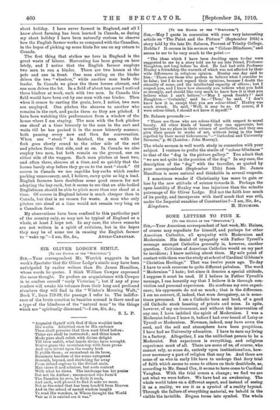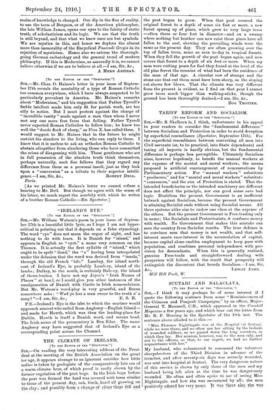SOME LETTERS TO PIUS X.
[To THE EDITOR OP TER "SrEornos."] SIN,—Your American correspondent of last week, Mr. Haines, of course may repudiate for himself, and perhaps for other American Catholics, all sympathy with Modernism and Modernists. His denial of sympathy with Father Tyrrell's message amongst Catholics generally is, however, another question. Criticism of American Catholics would on my part be invidious; I know nothing about them. My sole point of contact with them was the study at school of Cardinal Gibbons's " Christian Heritage." That was twelve years ago. To-day I have to seek recourse to quite different pabulum. The word " Modernism" I hate ; but since it denotes a special attitude, I suppose it must be used. If I believe in Father Tyrrell's message, I can honestly say that I believe it is through con- viction and personal experience. He confirms my own experi- ence; his opponents do not so much ; that is the difference. I am no convert, if, indeed, that were derogatory, as is some- times presumed. I am a Catholic born and bred, of a good old Catholic stock boasting of priests and nuns. In spite, however, of my environment, and without the intervention of any one. I have imbibed the spirit of Modernism. I was a Modernist before I knew it, before I bad ever heard of Loisy or Tyrrell or Modernism. Newman, indeed, may have sown the seed, and the soil and atmosphere have been propitious. I have had no University education. I have to earn my living in a factory. Altogether, I am the unlikeliest person to be a Modernist. But experience is everything, and religious experience most of all. There are some of us, of course, who cannot rely, as some do, entirely upon institutionalism, how- ever necessary a part of religion that may be. And there are some of us who in early life have to undergo that fiery trial of faith which seems to come to others on their deathbeds, as, according to Mr. Snead Cox, it seems to have come to Cardinal Vaughan. With the trial comes a change; we find we are not what we were before. We have bad an awakening. The whole world takes on a different aspect, and instead of seeing it as a reality, we see it as a symbol of a reality beyond. Through the failure of everything material, we behold in the visible the invisible. Dogma turns into symbol. The whole
realm of knowledge is changed. Our dip in the flux of reality, to use the term of Bergson, or of the American philosopher, the late William James, opens our eyes to the falsity of static truth, of scholasticism and its logic. We see that the truth is still beyond, and that what we knew once are but symbols. We are mystics in this, and hence we deplore the almost more than immorality of the Encyclical Pascendi Gregis in its rejection of mysticism. Hence also we esteem the thorough- going German eschatology and the general trend of modern philosophy. If this is Modernism, as assuredly it is, we cannot believe otherwise if we are to believe at all.—I am, Sir, &c.,
A MERE ARTISAN.











































 Previous page
Previous page